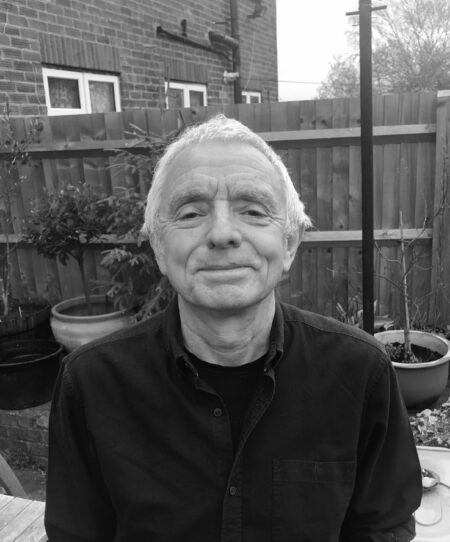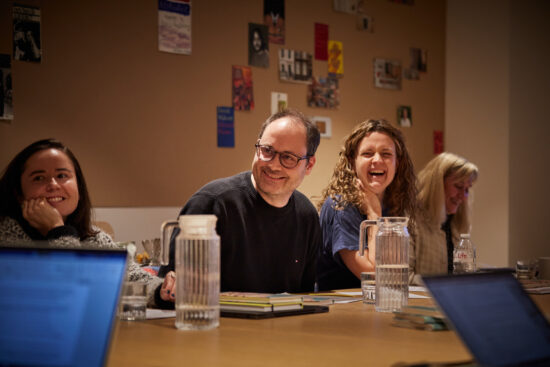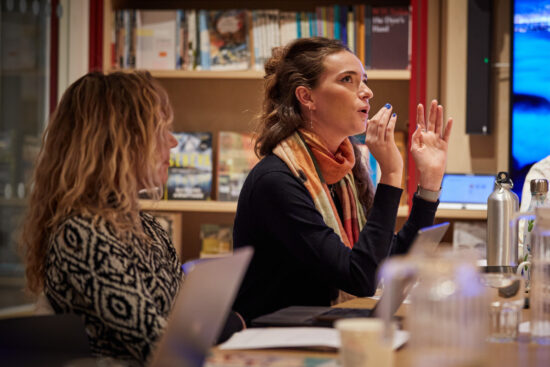


How to Write Audio Drama
4 minutes read
How do you write audio drama? From radio plays to podcasts, the form is thriving – but how do you engage listeners in a story solely through sound?
Mike Harris, tutor on Faber Academy’s Writing Audio Drama course, shares his top tips for writing audio drama (and some for writing any drama).
Audio drama is like every other kind except . . .
. . . unlike screen and theatre, you can’t actually see anything. Despite this, it’s the most visual medium because you get to create powerful images in the listener’s mind, which is the most sophisticated and vivid visual platform there is (movies don’t even come close).
However, if your audience doesn’t hear it, it’s not there.
Writing something down as if it’s a description in a novel or short story doesn’t make it ‘legible’ for your listener – for example, ‘Bruce applying sunblock lovingly to his pulsating pecs on Bondi beach’ is not going to cut the acoustic mustard without dialogue, i.e. it’s got to be in specific scripted words as well as scripted sounds, and usually both or you’re liable to set your audience adrift in acoustic outer space. Get sound and dialogue right and you can take them anywhere, in a few seconds.
But don’t overdo the sound because . . .
. . . it’s easy to confuse an audience, especially if you are new to the job. To begin with, keep the noises few but effective and nearly always walk them hand-in-hand with dialogue so neither falls over into that void, for example, something like:
(Fade in ‘Waltzing Matilda’ add general beach ambience. CU sound of sunblock being slapped on flesh)
SHEILA: (approaching) Jeez Bruce, leave those pecs alone for once will ya?
BRUCE: No way babes, I want them to glow, not incinerate.
Easy to say but hard to do well (as you may have just noticed)
Then, make things happen.
I mean action. Yes, in audio drama, yes! Because people do things. Even when they’re just talking in rooms (and please don’t spend all or most of your drama in them, because there is world upon world out there). What characters do is invariably more revealing and interesting than what they say, which is mostly lies, self-delusion or obfuscation (just like people in real life).
And the rest is the same for all would-be dramatists (audio or otherwise, established or newbie) and maybe all writers? Here’s some of it anyway . . .
'Drama is bad things happening to people, dummy, not nice people being nice to each other.'
Pin that above and behind your laptop in 140 point, in CAPS, UNDERLINED, EMBOLDENED and italicised adding, if you like, ‘it’s all about obstacles, conflict and dissonance, not harmony and agreement.’
Oh yes, and turn off your crap detector when writing first drafts . . .
. . . so you can get it finished for, as the screenwriter William Goldman wisely said, ‘Until you’ve put a full stop at the end, it’s all just a writing exercise’ and, as I say, ‘you can make crap better, you can’t improve something that’s not there.’
And in the end? You’ll need talent, luck and persistence . . .
. . . of which persistence is by far the most important, especially in those moments when you’re absolutely convinced you’re the worst writer who ever lived who’s just written the worst thing ever written (and you may be and may have, of course, but there’s a chance you might not be and may not have, and if you give up now you’ll never find that out, will you?)
And don’t listen to considerate friends who always tell you your work is great, because . . .
. . . they’re your worst enemy. Listen to the ones you absolutely hate because they tell you exactly what’s wrong with your precious babies and, when you’ve calmed down, you realise they’re right (some of the time at least).
And that’s probably enough to be going on with.

Mike Harris is a script writer, dramatist, director, and experienced creative-writing tutor.
He has written more than 150 single-plays, adaptations, series and soap episodes for radio, stage, touring theatre, and TV. He has taught script writing at all stages from community workshops to MA and has worked extensively with novelists on structure and plotting.
He is the tutor of Faber Academy’s online Writing Audio Drama: From Plays to Podcasts course.
End





